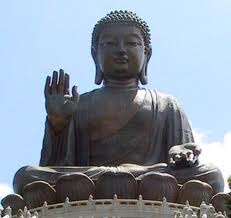Difference between revisions of "Advesha"
Jump to navigation
Jump to search
(Created page with "Advesha (Sanskrit; Pali: adosa; Tibetan Wylie: zhes sdang med pa) is a Buddhist term translated as "non-aggression" or "non-hatred". It is defined as the absence of an aggress...") |
|||
| Line 1: | Line 1: | ||
| + | [[File:8a2f8 l.jpg|thumb|250px|]] | ||
Advesha (Sanskrit; Pali: adosa; Tibetan Wylie: zhes sdang med pa) is a Buddhist term translated as "non-aggression" or "non-hatred". It is defined as the absence of an aggressive attitude towards someone or something that causes pain. It is one of the mental factors within the Abhidharma teachings. | Advesha (Sanskrit; Pali: adosa; Tibetan Wylie: zhes sdang med pa) is a Buddhist term translated as "non-aggression" or "non-hatred". It is defined as the absence of an aggressive attitude towards someone or something that causes pain. It is one of the mental factors within the Abhidharma teachings. | ||
| Line 6: | Line 7: | ||
{{W}} | {{W}} | ||
| − | |||
| − | |||
| − | |||
[[Category:Buddhist Terms]] | [[Category:Buddhist Terms]] | ||
| + | [[Category:Buddhist psychology]] | ||
Revision as of 07:57, 25 January 2013
Advesha (Sanskrit; Pali: adosa; Tibetan Wylie: zhes sdang med pa) is a Buddhist term translated as "non-aggression" or "non-hatred". It is defined as the absence of an aggressive attitude towards someone or something that causes pain. It is one of the mental factors within the Abhidharma teachings.
The Abhidharma-samuccaya states:
- What is advesha? It is the absence of the intention to harm sentient beings, to quarrel with frustrating situations, and to inflict suffering on those who are the cause of frustration. It functions as a basis for not getting involved with unwholesome behavior.
